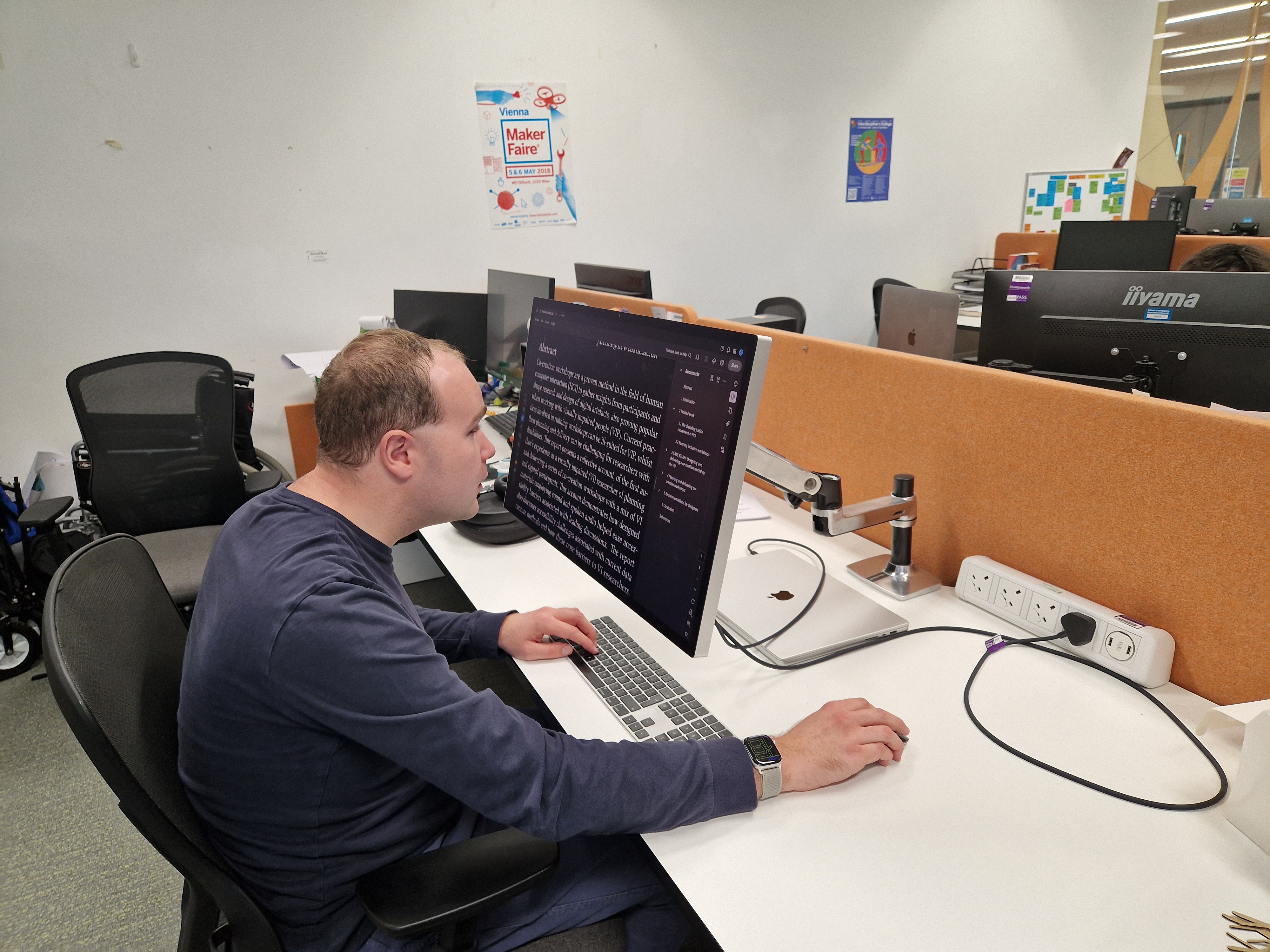Celebrating Diversity: Supporting PhD students with disabilities at School of Computing
20% of Postgraduate Research home students across the UK have a declared disability: how does the School of Computing support their studies?
29 October 2025
According to research from the Higher Education Statistics Agency (HESA), 20% of Postgraduate Research home students have a declared disability. Newcastle University offers support to students with disabilities and long-term health conditions through our Disability Support team, as well as more locally within the School of Computing. We spoke to two of our Postgraduate Research students about their experience studying with a disability.
Michal Burnage is a PhD student in Open Lab research group and has previously been diagnosed with dissociative amnesia, depersonalisation and derealisation disorder (DPDR). He began his PhD in AI-enhanced medical systems in January 2025 after graduating with a BSc (Hons) in Computing & IT and Business. Combining his academic and personal experiences, he wants to further research in this field and create solutions that can help people with similar conditions.
Describe your project in a couple of sentences
My PhD project is looking at how an AI system could assist in minimising common clinical and support issues around depersonalisation/derealisation (DPDR) disorder. It's common for patients to not know their "exit trigger/s" - these are coping methods or things that can lower symptom intensity or reduce symptoms entirely. Additionally, DPDR can be a symptom of another condition, which should not be confused with the disorder. Exit triggers and their effectiveness can differ from person to person and can be even less effective when the DPDR are symptoms of another underlying condition. Therefore, my system will aim to include:
- a recommendation that suggests personalised exit triggers to a patient based on machine learning data patterns.
- a system that gives the probability of someone having DPDR disorder and if it’s present whether it’s likely to be a symptom of another disorder instead.
- an information hub about depersonalisation and derealisation for patients and their families.

Why did you decide to do a PhD?
In my early 20s I was medically discharged from the British Army following diagnosis of dissociative disorders.
The main treatment for these disorders is therapy to help you identify your triggers that lead to a dissociated episode. However, many people struggle to identify their triggers even with therapy, which can make managing the condition more difficult. Unfortunately, there is not much support available for people in this situation.
I want to use my background in Computer Science to further the research in this field and create solutions that can help myself and others with similar conditions.
What support have you had from Newcastle University?
Before attending university, I spoke with a nurse who assessed my condition and what adjustments I may need. My main concern was how unpredictable my symptoms can be, so I was given reasonable adjustments to work around my condition. This has greatly reduced the worry I have about my condition and allowed me to focus on my research. My Disability Advisor also checks in on me to see whether anything needs to be adjusted.
I’ve also used Disabled Students Allowance (DSA) to help with the additional costs I face having to travel to campus using a third-party taxi service. I pay the cost of using public transport, and the remainder is covered using the DSA funding.
Peter Hayton is a visually impaired PhD student and Postgraduate Teaching Assistant working in Open Lab research group. He began his PhD in Human Computer Interaction in September 2023 and previously graduated with a BSc (Hons) in Computer Science – also from Newcastle University – in 2021.
Please tell us about your PhD research project
My research focuses on the mobility challenges facing visually impaired people, including inaccessible public transport and the poor design of urban infrastructure. I am considering how future technologies could be used to tackle the physical and digital barriers visually impaired people face to help improve mobility in cities, including how this technology could be used between visually impaired people and other members of society.
In addition, I am also looking at the accessibility of design research methods with a focus on visually impaired researchers. Some of these methods can mean people feel excluded from becoming researchers, so I want to look at ways to make them more inclusive.
.jpg)
Why did you decide to do a PhD, and why on this topic?
As a visually impaired person, I have lived experience using specialised assistive technologies which have been developed to help people like me navigate urban spaces confidently – but this does mean I’ve also experienced how these solutions often fall short of what we actually need!
I’ve also experienced how the increased digitisation of transport has unfortunately increased the barriers to access. I believe everyone has the right to access urban spaces, and advances made in technology should address the challenges of reduced mobility, not add to them. My hope is that my research will provide solutions to the challenges caused by inaccessible information.
Have you made any adaptations in how you do your research due to your disability?
Given my visual impairment, there are several research methods (particularly regarding more traditional methods used in Human-Computer Interaction to capture and analyse data) which are inaccessible to me (see 'Accessibility of High-Fidelity Prototyping Tools' paper here) However, I believe there should always be ways to get around this, and I have been able to adapt my work with accommodations such as increased use of audio when running research activities or conducting analysis.
I’d like to use my work to share with the research community how these alternative approaches create a more accessible research space for everyone. I co-authored a paper earlier this year on this inaccessibility as part of the workshop I ran at CHI 2025.
What support have you had from Newcastle University?
During my time at university, I have been able to use Disabled Student’s Allowance, which supports both Undergraduate and Postgraduate students with the funds required to purchase specialist equipment and the software needed to complete your course.
In my case, I now have an accessible workstation which means I am able to work and study on campus, along with a computer that is tailored to my specific needs. Reading PDF documents are really important to access information, but not all documents are created equal (see academic paper here) and I therefore have access to Adobe Acrobat Pro for PDFs which allows me to make adjustments to how the document displays, as well as adding tags to inaccessible PDFs so I can use my screen reader.
My computer also has a large, high-quality screen with high contrast which makes the text and images stand out more clearly. My keyboard also has additional functionality to create shortcuts in the VoiceOver screen reader and use gestures specific to my device.
While I was an Undergraduate student, I was also able to request adaptations to lecture content that meant I could fully engage with the material.

Is there anything you’d like to add?
The disability justice movement is becoming more prevalent in Human-Computer Interaction. Lived experience of disability is key to making research a more inclusive field for everyone. While there is still more work to be done until working in research is truly equitable, I believe bringing more varied perspectives to the table brings us a step closer.
Peter’s Experience Report (The blind leading the blind: designing a co-creation workshop for visually impaired and sighted participants by a visually impaired researcher) will be published at the ACM ASSETS 2025 conference, taking place in Denver, Colorado in October 2025.
